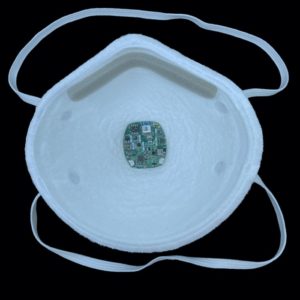Smart face mask monitoring device
Engineers at Northwestern University have developed a new smart sensor platform for face masks; they’re calling it a “Fitbit for the face.” The research is funded by the U.S. National Science Foundation.
Dubbed “FaceBit,” the lightweight, quarter-sized sensor uses a tiny magnet to attach to any N95, cloth or surgical face mask.

About the size of a quarter, FaceBit clips onto any mask with a small magnet.
Not only can it sense the user’s real-time respiration rate, heart rate and mask wear time, it also may be able to replace cumbersome tests by measuring mask fit. All this information is then wirelessly transmitted to a smartphone app, which contains a dashboard for real-time health monitoring. The app can immediately alert the user when issues — such as elevated heart rate or a leak in the mask — unexpectedly arise. The physiological data could also be used to predict fatigue, physical health status and emotional state.
Although a tiny battery powers the device, FaceBit is designed to harvest energy from a variety of ambient sources — including heat and motion from a user’s breathing and from the sun. This extends the sensor’s battery life, lengthening time between charges.
“We wanted to design an intelligent face mask for health care professionals that does not need to be inconveniently plugged in during the middle of a shift,” said Northwestern’s Josiah Hester, who led the device development. “We augmented the battery’s energy with energy harvesting from various sources, which means that you can wear the mask for a week or two without having to charge or replace the battery.”
The research was published in Proceedings of the ACM on Interactive, Mobile, Wearable and Ubiquitous Technologies. In the study, researchers found that FaceBit’s accuracy was similar to clinical-grade devices, and that the battery lasted longer than 11 days between charges. More information is available at facebit.health.



